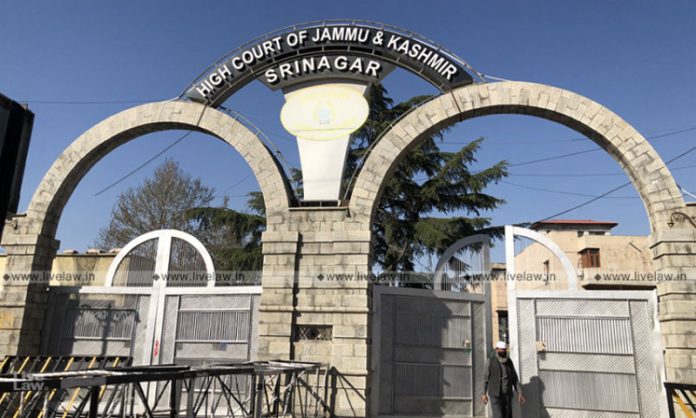Contractors debarred as relatives were involved in subversive activities
*Says right to carry on trade can’t be tinkered with
Mohinder Verma
JAMMU, May 26: Quashing a communication whereby contractors were debarred from executing works merely on the ground that their relatives were involved in anti-national activities in the past, High Court of Jammu & Kashmir and Ladakh has asked the Chief Secretary to initiate departmental action against the then Commissioner Secretary to the Government, Department of Rural Development and Panchayati Raj and submit action taken report.
Follow the Daily Excelsior channel on WhatsApp
Moreover, bench of Justice Sanjeev Kumar dubbed the communication as an onslaught on the well thought after decisions taken by the Government for bringing the misguided youth and others into the mainstream through the rehabilitation policies.
The case involved multiple petitions filed by registered contractors under the J&K Registration of Contractors Rules, 1969. They were debarred from participating in tenders for public works by the Department of Rural Development and Panchayati Raj based on a report from the CID that their close relatives including brothers, uncles and nephews had been involved in subversive activities in the past.
Challenging this decision, the petitioners submitted that order of the Rural Development Department violated their fundamental right to practice any profession or carry on any occupation, trade or business guaranteed under Article 19(1)(g) of the Constitution of India. They further contended that they had not been convicted of any offense and their character verification reports did not mention any adverse findings against them.
The Department of Rural Development and Panchayati Raj defended its decision, stating that it aimed to bring fairness and transparency to the allotment of Government contracts and keep those involved in anti-national activities out of such projects.
After hearing both the sides, Justice Sanjeev Kumar observed, “there is nothing adverse noticed by the CID against the petitioners while verifying their character/antecedents. The petitioners can, by no stretch of reasoning, be penalized and deprived of their right to livelihood on the ground that one or more relatives of the petitioners had, in the past, indulged in anti-national activities”, adding “the impugned communication not only violated the fundamental rights of the petitioners but also deprived them of their right to livelihood”,
Pointing towards Jammu and Kashmir Registration of Contracts Act and Rules governing contractor registration and which prescribe specific grounds for disqualification, Justice Sanjeev Kumar said, “the petitioners have not incurred any of the disqualifications under the Act and the Rules framed there-under and, therefore, hold valid certificates of registration issued by the competent authority. These certificates were issued by the competent authority after recording satisfaction about the eligibility and fulfillment of requisite conditions by the petitioners”.
The petitioners cannot be denied the right to enter into contracts with the Government for public works based solely on their relatives’ involvement in anti-national activities in the early 90s or later as the valid registration certificates issued to the petitioners by the competent authority entitle them to participate in Government contracts, High Court said.
Expounding on the mandate of the right to life and liberty guaranteed under Article 21 and the right to carry on trade or business guaranteed under Article 19(1)(g), High Court said that the restrictions on these fundamental rights cannot be imposed otherwise than in accordance clause (6) of Article 19.
“Such restriction must be reasonable in general public interest and imposed by law. The restriction on the fundamental right to carry on trade or business guaranteed under Article 19(1)(g) of the Constitution, even if it is reasonable, cannot be imposed by the Government through executive fiat”, the High Court underscored.
High Court further noted the Government’s rehabilitation policies for ex-militants and surrendered militants, emphasizing the importance of reintegration into mainstream society. It deemed the impugned communication to be against the spirit of these policies and a disregard for the well-being of the petitioners who were not responsible for the actions of their relatives.
Accordingly, High Court allowed the petitioners and quashed the communication with the direction to the authorities to permit them to participate in the tender process if they meet the eligibility criteria.
Further, the High Court has directed the Chief Secretary of the Union Territory of Jammu and Kashmir to initiate departmental action against the then Commissioner Secretary to the Government, Department of Rural Development and Panchayati Raj, who issued the impugned communication, disregarding the law and causing prejudice to the petitioners.
A report with regard to action taken against the then Commissioner/Secretary to Government, Department of Rural Development and Panchayati Raj shall be submitted by the Chief Secretary to this court within a period of two months from the date a copy of this judgment is served upon him. For this purpose only, the matter shall be listed on 29.07.2024″, Justice Kumar concluded.


